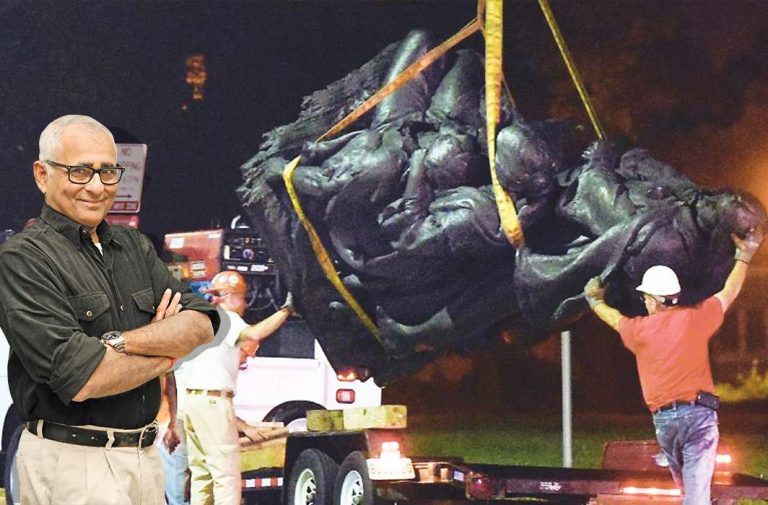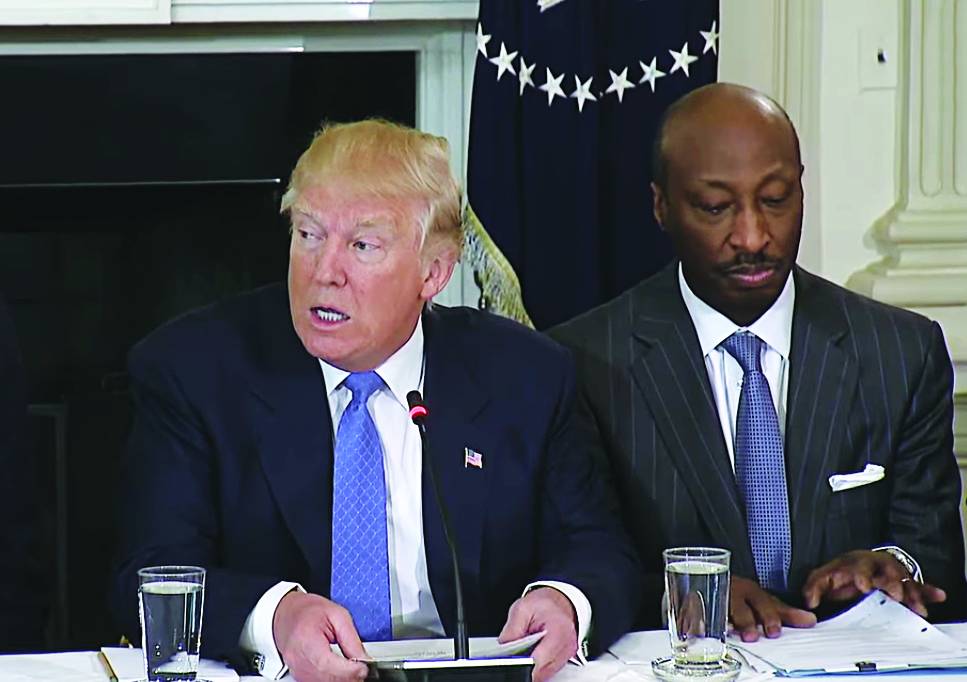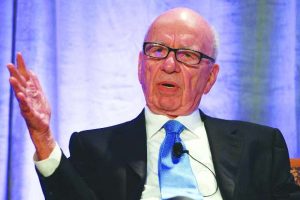
~By Inderjit Badhwar
WASHINGTON DC: As a summer of discontent unfolds in America, the world waits and watches to discover how far the most powerful man can manoeuvre the legal and constitutional chains which bind together the most powerful democracy on earth into a nation governed by the rule of law.
The biggest story in the US as of now is not what President Donald Trump is doing to circumvent the boundaries of political circumspection laid through convention, law, precedents and plain, good old-fashioned sense of decency, but what the country’s institutions are doing to resist the onslaught.
The story so far is that America is not taking it lying down. The President may control the most formidable armed forces in the world, the nuclear codes of an Armageddon, the Republican Party majority in both Houses of the Congress and a determined cohort of hardcore supporters who would not budge from their loyalty, as Trump once said during the campaign “even if I stood in the middle of Fifth Avenue (in New York) and shoot somebody”. But as hard as he may try, he has not so far been able to make a major dent in any American institution on which the Republic has been founded.
If anything, the fightback, the “resistance”, is as strong as Trump’s attempt to overcome it. His most recent attempt at using divisive tactics—“polarisation” as it is called in India—came during his now infamous press conference at New York’s Trump Towers. Here, he equally blamed a non-existent “alt left” and white supremacist Nazis for the violence and death of a young woman following a torchlight procession in Charlottesville, Virginia, where right-wing fanatics carried assault weapons and Hitler Youth flags, screaming racist and anti-Jewish slogans.

Despite his own attorney general, Jeff Sessions, having earlier condemned these neo-Nazis, Trump took his gloves off and showed sympathy for some of the “nice” people who marched with the violent white supremacists whose stated goal is to make America white again and relegate all non-white immigrants to second class citizenship. The Nazi demonstration was to protest the pulling down of the statue of Gen Robert E Lee, the leader of the separatist pro-slavery Southern forces who rebelled against the American union in the Civil War of the 1860s. Communities across American cities are pulling down these “confederate statues” because they are considered a blot on the modern American values of equal and civil rights and racial and ethnic justice.
Trump went even farther and actually praised these confederate rebel leaders who tried unsuccessfully to split America through an armed rebellion as American patriots who were part of its heritage. Well, this certainly didn’t win him any friends on Fifth Avenue in New York. In fact, when he came to visit his Trump Towers apartment last week, thousands of demonstrators gathered on the street to boo him. The local police had to barricade the Avenue for the next couple of days Trump stayed there before he fled to his New Jersey Golf Course resort and tweeted even more defiance from there, much to the chagrin of his White House staff.
This is the first time in history that a US President had openly and defiantly espoused the cause of confederate leaders who went to war against their own country to defend the continuation of slavery, as well as equated armed anti-Semitic and racist street marchers with those who opposed their bigotry.
The biggest story in the US as of now is not what President Donald Trump is doing to circumvent the boundaries of political circumspection laid through convention, law, precedents and plain, good old-fashioned sense of decency, but what the country’s institutions are doing to resist the onslaught.
During the presidential campaign, Trump’s speeches about immigration, his views on women, his blatantly sexist denigration of women, his record of not allowing blacks into his development projects had all pointed to a racist, megalomaniacal misogynist in the race which he won with less than 48 percent of the popular vote.
But many Americans believed that as he settles into the presidency, he would settle into his job. As Jim Thomas, a nuclear engineer and prominent blogger told me: “Not all of Trump’s supporters are racist or alt right members. But these extremist groups are strong supporters. That’s why his first response to being asked to condemn David Duke (the Grand Wizard of the white supremacist Ku Klux Klan) was to claim he did not know him! Trump’s press conference, however, was the worst performance I have ever seen in my lifetime. I cannot believe that I actually thought he would grow into the job. Wow, was I wrong!”
Thomas is hardly alone. Polls show that because of Trump’s erratic and authoritarian behaviour, his core support across the nation has dropped by more than 30 percent. As I said earlier, the big story in America right now is about not only individuals, but also those fighting back to try and save the legal and institutional values of their nation.
The first counter attack was launched by the judiciary when it ruled that Trump’s immigration restrictions were discriminatory and halted any further implementation without modifications. Final judgments and challenges are still awaited. Immediately after Trump’s recent press conference, mayors across cities, starting with Baltimore, have begun pulling down confederate statues. In an unprecedented action, all the Joint Chiefs of Staff have signed a statement expressing their abhorrence for white supremacist doctrines, racism and Nazi sympathisers. Many American football players have preferred to kneel rather than stand as the national anthem is played during this pre-season kick-off time as a mark of protest against the Charlottesville march and Trump’s refusal to condemn it.
While Trump’s party is not yet splitting over this issue—there has been no explicit condemnation of him as I am writing this—the Party’s Congressmen and senators are, for the most part, nervous and even horrified. Indirectly, though, many powerful voices like Senator Ted Cruz of Texas have vilified and condemned white supremacism in all its manifestations.
The biggest surprise, however, has come from the captains of commerce and industry—which is a story in itself. Last week, top American CEOs, who have long avoided politics, but who are huge contributors to the Republican Party, began resigning from their positions in Trump’s business advisory councils. This was in response to his refusal to condemn the white supremacist movement and the events at Charlottesville. The biggest blow was dealt by Walmart chief Doug McMillon who commands 4,692 stores across America, attracting 140 million customers a week. He excoriated Trump in a letter circulated to all his employees for “not unequivocally rejecting the appalling actions of white supremacists”. Some of the more prominent corporate defections from the White House include Pepsico’s Indra Nooyi, General Motors’ Mary Barra, IBM’s Virginia Rometty and Rich Lesser head of the Boston Consulting Group. The chiefs of Merck, Intel, and Under Armor had stepped down earlier.
Wrote James B Stewart in Business Day: “Such a public schism between a president and a business leadership long considered the backbone of the Republican establishment left corporate historians at a loss for precedent.”

The fightback against the possible adverse national divisive effect of a Trump presidency had begun in the mainstream American media during the election campaign last year when every manner of skeleton came tumbling out of Trump’s closet. He dismissed The Washington Post, CNBC, CNN and CBS as purveyors of fake news, while he aired his view uncensored and unquestioned on FOX News and Breitbart. Despite the official opprobrium heaped upon them, mainstream American media persisted doggedly in “doing our job”, neither cringing nor bowing, not scraping, and refusing to be intimidated. In fact, Trump’s presidency caused a more or less somnolent media, including late night TV political satirists like Bill Maher and the Saturday Night Live crew, to bounce back to life with fearless commentary and some of the best investigative reporting seen since Watergate.
Today, even the New York Post, owned by Rupert Murdoch, Trump’s friend, has been critical of the President’s stand on white nationalists. The mainline press has been merciless. A CNBC commentator described Trump as a “moral monster”. Following the Trump presser in New York, another national channel titled a special programme on him, “Divider in Chief.”
As I see it, having spent my youth as a young reporter in America, the socio-political regression is incredible. The alt right had always been strong and vociferous and aggressive. But the lynchings and cross burnings had subsided following the strong enforcement of civil rights legislation in the 1960s during the Kennedy-Johnson era by the federal government.
What we are seeing today is the post-Obama “whitelash” emboldened by Trump’s electoral victory which was fuelled by barely disguised subliminal signals appealing to white resentment over being “left behind” the starting line because of perceived advantages given to other races through affirmative action and the relentless onslaught on Jim Crow.
I use the word “regression” only to illustrate the point that in the 1960s and early 1970s as desegregation was proceeding through measures like compulsory school bussing, white angst was palpable in the likes of Governors George Wallace and Lester Maddox, openly-expressed racism and anti-Semitism. These were already politically unacceptable even in the Washington Republican establishment, though like Richard Nixon, it fed surreptitiously on this sentiment.
But even Nixon, for those who may care to remember, was forced to fire his Agriculture Secretary Earl Butz for sharing a private anti-Black joke during a plane ride with singer Pat Boone.
This kind of sensitivity may have been enforced but it did show, nonetheless, that America had risen to a state of socio-political consciousness in which there would be Zero tolerance for any display of racism—public or private—at the presidential level.
This is what has been compromised under the Trump presidency. He is finally out of the closet and standing up for what he believes in.
But the bigger story is that not just the “fake press”—but most American institutions and responsible people who lead them are standing up to him. It’s a fightback.
—Inderjit Badhwar is Editor-in-Chief, India Legal.
He can be reached editor@indialegallive.com

